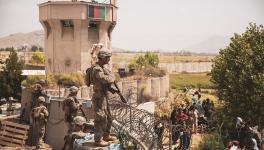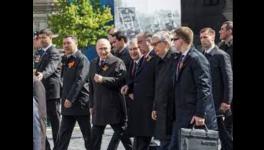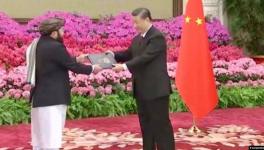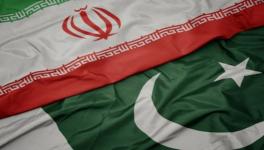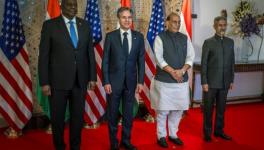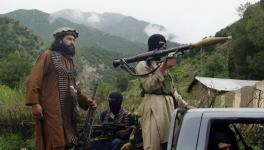Reflections on Events in Afghanistan-19

Family photo of the 20th summit meeting of the Shanghai Cooperation Organisation, Dushanbe, September 17, 2021
As expected, the situation in Afghanistan was the focal point of the discussions at the 20th summit meeting of the Shanghai Cooperation Organisation (SCO) in Dushanbe on Friday. Yet, the SCO’s Dushanbe Declaration is scanty on the topic.
The 8300-word document devoted hardly 170 words to the Afghan situation. It made just three inane points, namely, that the SCO member countries
- support the emergence of Afghanistan as an “independent, neutral, united, democratic and peaceful State, free of terrorism, war and drugs”;
- believe it is “critical to have an inclusive Government” in Afghanistan; and,
- consider it important that the international community makes “active efforts” to facilitate Afghan refugees return to their country.
A mountain gave birth to a mouse! The SCO’s stance is based on consensus decisions and given such big divergences in the viewpoints of member countries, a consensus was hard to reach. read more
This is a setback for the SCO insofar as it has so little to say and even less to contribute to the resolution of the single biggest crisis in regional stability and security the grouping has had to face in its entire history.
How did this happen? The short answer is that India chose to be a lone ranger tilting at the SCO windmills. Prime Minister Modi made two hard-hitting speeches on September 16 and 17 respectively — the first one at the SCO summit on the “future of the SCO” (here) followed by a second speech at the SCO-CSTO Outreach Summit that was exclusively devoted to Afghan developments (here).
Modi came down emphatically on the “transition of power” in Afghanistan which, he said, “happened without negotiation” and, therefore, “raises questions about the acceptability of the new system.” He virtually questioned the legitimacy of the Taliban government.
Modi recommended: “And therefore, it is necessary that the decision on recognition of such a new system is taken by the global community collectively and after due thought. India supports the central role of the United Nations on this issue.”
The contrast between Modi’s speech and those of Russian President Vladimir Putin and Chinese President Xi Jinping couldn’t have been sharper. Both Putin and Xi urged the world to unfreeze Afghanistan’s assets and boost assistance. They urged The Taliban government to remain peaceful to the neighbours and combat terrorism and drugs trafficking.
Most important, they urged the SCO to “use its potential” to “stimulate the new Afghan authorities” in fulfilling their promises and bringing security to Afghanistan. Xi said, in particular, that the SCO member nations should help to drive a smooth transition in Afghanistan.
In essence, Modi called on the SCO to harmonise with the US-led moves at the UN Security Council. Plainly put, the SCO should play second fiddle to the QUAD, which is also holding a summit in Washington, DC, on September 24 where Afghanistan is expected to be a key agenda item. Before the QUAD summit, President Biden is due to meet with Modi on the same day.
The Dushanbe Declaration will be received with a sigh of relief in Washington. India has practically blocked the SCO from taking any assertive role on Afghanistan, which of course creates time and space for the US to press ahead with its strategy.
The calibrated US strategy vis-a-vis the Taliban aims at American reentry into the Afghan theatre so that the Pentagon and the CIA can pursue the “strategic competition” with Russia and China and destabilise Iran. Washington is pressuring the Taliban to make it realise that it has no future without American approval and unless the US has its way, that approval will be withheld and Washington will continue to make life hell for the Taliban government.
The US estimates that left to itself, the Taliban is keen to have a “win-win” relationship with Washington. Against this backdrop, the US views the SCO as a potential “spoiler.”
However, the Dushanbe Declaration is not the last word, nor can the SCO be held hostage to blackmail. On the sidelines of the SCO summit, four member countries already put their heads together to plough an independent furrow — China, Pakistan, Russia and Iran.
The foreign ministers of these four countries met in Dushanbe separately on September 17. Interestingly, this core group issued a joint statement, which shows that the initiative was far from impromptu.
The joint statement underscored the centrality of the sovereignty, independence, and territorial integrity of Afghanistan and of the “Afghan-led, Afghan-owned” principle. It is an implicit rejection of any unilateral US interventions in Afghanistan. read more
Incidentally, the US Secretary of State Antony Blinken disclosed this week in Congressional hearings in Washington that Biden Administration is engaged “deeply” in discussions with India for facilitating the US’ “over-the-horizon” attacks on Afghan targets that are being planned. read more
Chinese State Councilor and FM Wang Yi put forward a five-point proposal at the meeting of the FMs on the “coordination and cooperation” among the four countries related to Afghanistan in the next stage: First, urge the United States to earnestly fulfill its obligations and take its responsibility. Second, contact and give guidance to Afghanistan. Although Afghanistan has established an interim government, it has not finalised its domestic and foreign policies. Third, guard against the spillover of security risks. Fourth, encourage all parties to form synergy to assist Afghanistan. Fifth, help Afghanistan join in regional cooperation. read more
Clearly, the US-Indian collusion over Afghan operations is generating unease in the region. Pakistani PM Imran Khan has had a “lengthy” meeting with Tajik president Emomali Rahmon and he subsequently told the Kremlin’s RT channel that he is working with Afghanistan’s neighbours to determine what the current setup in Kabul can do in order to gain the international community’s recognition.
Imran Khan remarked that the recognition of the Taliban government would be a significant step. He was brutally frank about what is at stake: I think the only one choice left is to incentivize [the Taliban], to encourage them to stick to the promises and announcements they have made about an inclusive government, about human rights, [about] giving amnesty to everyone,” he said. “Hopefully, if it works, you can have peace in Afghanistan for the first time in 40 years.” read more
But India has a closed mind on the Taliban, which it sees as friendly toward both Pakistan and China. In strategic terms, India sees its interests best served by the US’ return to the geopolitics of Afghanistan to counterbalance Pakistan and China.
The Indian stance is contrary to the approach of not only Russia and China, but Uzbekistan and Kazakhstan, the two biggest Central Asian states, as well. The Uzbek president Shavkat Mirziyoyev said in his remarks at the Dushanbe summit,
“A new reality has emerged, new people have come to power. This is a fait accompli. That being the case, it is necessary to develop a coordinated approach to the situation in Afghanistan, as well as to develop dialogue with the new authorities.”
The Kazakh President Kassym-Jomart Tokayev voiced the same opinion in even stronger terms: “CSTO and SCO countries should initiate informal dialogue with the new authorities in Afghanistan. These communications will make it possible to assess the real intentions of the Taliban, and to form a shared understanding of threats to regional stability and restore trade and economic ties with this country.”
The regional states are unlikely to pay heed to Delhi’s red line on constructive engagement with the Taliban government. While for Delhi this is largely a shadow play against Pakistan and China, for other regional states, core interests of national security are involved and politiking is the last thing on their mind. The Moscow-led CSTO is gearing up for deployment on the Tajik-Afghan border.
Get the latest reports & analysis with people's perspective on Protests, movements & deep analytical videos, discussions of the current affairs in your Telegram app. Subscribe to NewsClick's Telegram channel & get Real-Time updates on stories, as they get published on our website.










